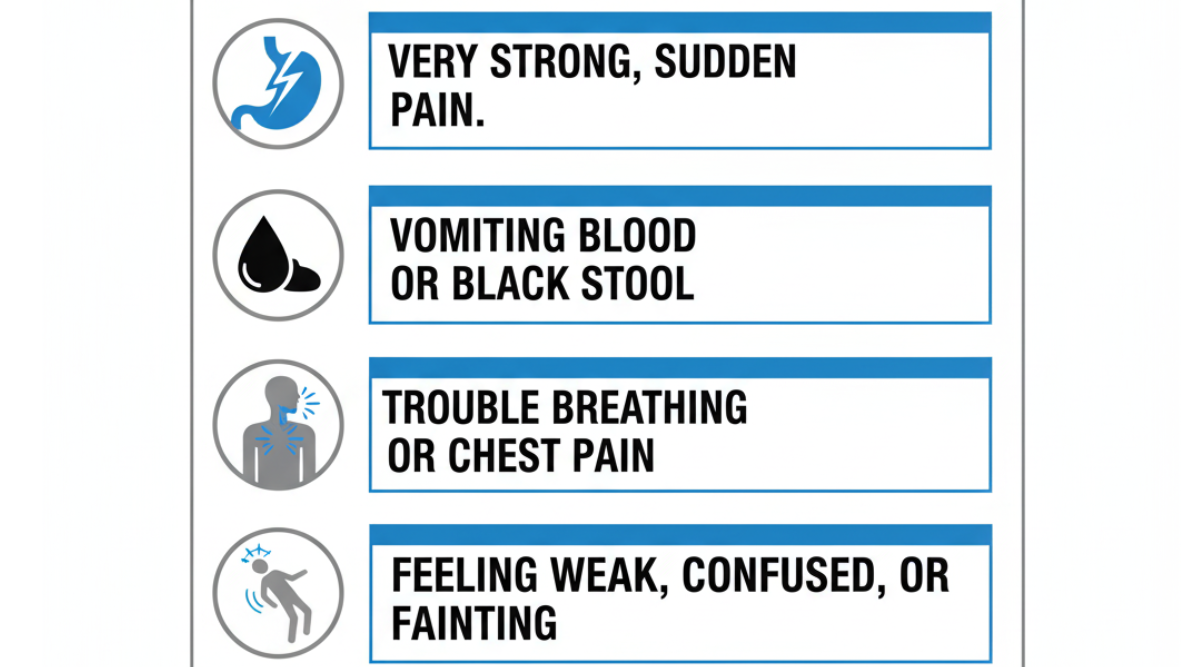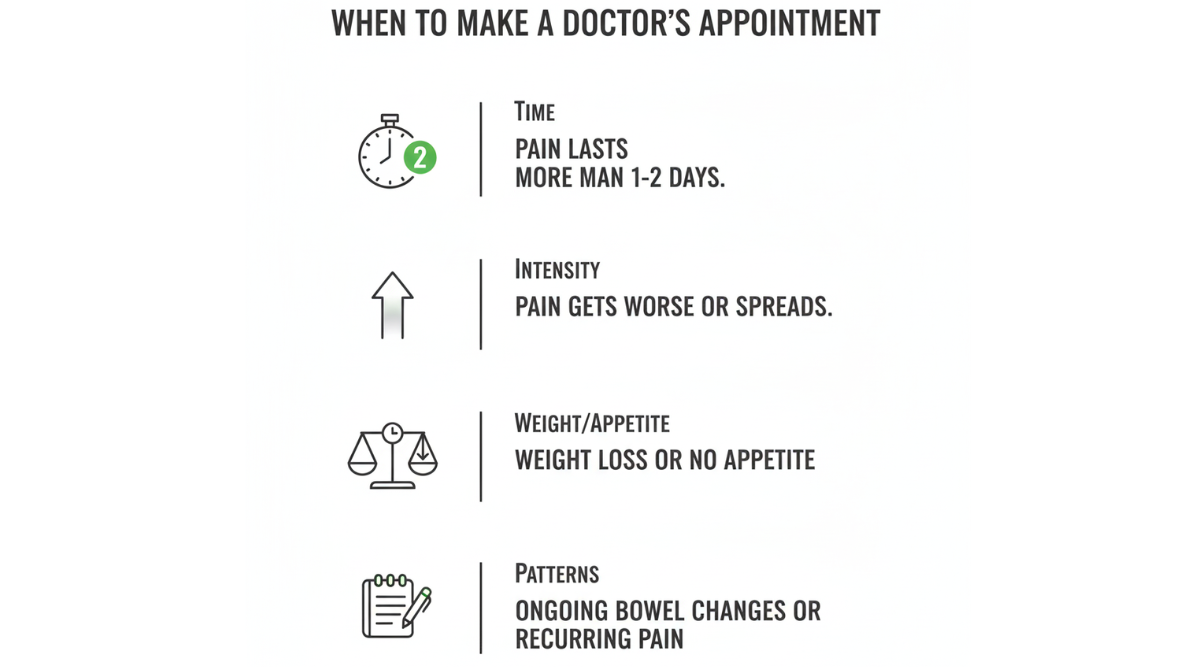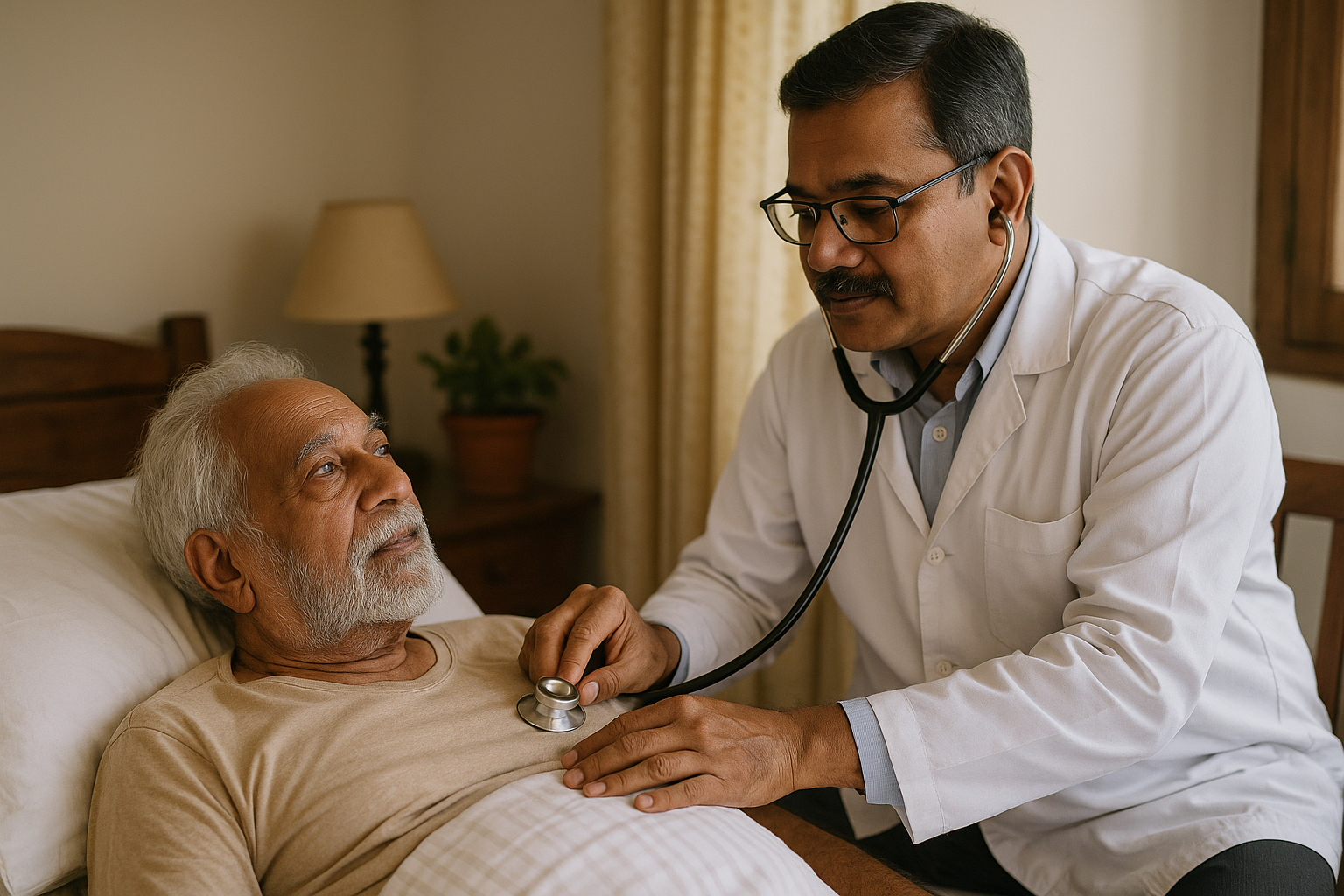Stomach pain can stop your day. Sometimes, it's just a harmless stomach upset. Other times, it means something serious that should not be ignored. At Dr. Morepen Home, your health and comfort are always important. Here, you’ll learn when it’s the right time to seek a doctor’s help. This article explains the signals, provides advice, and shares steps you should take if your pain continues, matches dangerous patterns, or starts to worry you.
Urgent Symptoms That Need Quick Medical Attention
Certain symptoms mean you should not wait. Getting fast medical help can protect you or your loved ones.
Signs When It’s an Emergency
- Very strong, sudden pain in your belly
- Chest pain, trouble breathing, or pain spreading to your back or jaw
- Vomiting blood or seeing black stool
- Not able to keep any fluids down
- A fever with belly pain that’s very high
- Feeling very weak, confused, or close to fainting
These may point to a severe problem that needs a doctor right away.
Pain That Often Means Serious Trouble
Watch out for:
- Severe pain in the lower right side (think of appendicitis)
- Pain after a hard bump or accident
- Bad cramps that come and go or do not let up
- Pain with ongoing vomiting or a swollen, firm stomach
Major Warning Signs (Blood, Fainting, Weakness)
If you see blood in what you vomit or in your stool, feel pale or sweaty, or nearly faint, you need a doctor fast. Losing consciousness or feeling lost and dizzy are also danger signs.
What Will Happen If You Go to the ER?
Doctors check your vital signs, start fluids, and do blood tests and scans. They will ask about your pain, check your belly by hand, and act quickly if they think something is wrong inside.

When to Call an Ambulance or Go to Urgent Care
Call for help at once if you see constant vomiting, lots of blood, cannot stand, or have trouble breathing. For pain that is strong but not quite as urgent, go to urgent care for a doctor’s check.
Ongoing or Worsening Stomach Pain - When to Make an Appointment
Not every pain is an emergency, but if it’s not going away, it needs attention.
Pain That Stays More Than 1 or 2 Days
If pain lasts more than a full day, or comes back often, talk to a doctor. It’s better to find out what’s wrong before it gets worse.
Pain That Gets Worse or Moves Around
If pain starts mild, then keeps getting stronger, or spreads, it may hint at bigger issues. For example, pain that shifts to the right lower belly could be appendicitis.
Watch for Patterns and Bowel Changes
Keep a note of:
- What triggers pain (food, stress, activity)
- When it starts, how it feels
- Any change in stool (constipation, diarrhea, blood)
Writing these down helps your doctor understand the problem.
Weight Loss or No Hunger
Losing weight even when you eat normally or feeling full too fast are not good signs.
How to Track Your Symptoms
Write down:
- When pain starts and ends
- What you were doing before it started
- Pain level (mild/moderate/severe)
- What helps or makes it worse
Bring this to your appointment.
Common Causes and More Serious Illnesses
Knowing causes helps you act quickly and avoid risk.
Common, Usually Harmless Causes
Sometimes pain is caused by:
- Indigestion, eating too much, or gas
- Stomach virus or food that upset your belly
- Mild constipation
This pain tends to go away in a day or two.
Issues That Need a Doctor
Stomach pain is more serious if:
- It keeps coming back
- It happens in the same spot
- It is bad enough that you can’t live normally
Appendix, Pancreas, and Gallbladder Issues
- Lower right stomach pain with fever/nausea can be appendicitis
- Upper belly pain that moves to your back may mean trouble with your pancreas or gallbladder
Pain Linked to Other Problems
Not all pain is stomach-related. Some other causes:
- Heart problems can feel like belly pain
- Sharp pain from kidney stones
- Women may feel belly pain due to their ovaries or uterus
Longer-Term Conditions
If pain happens often, with changes in bowel habits or blood in stool, tell your doctor. If someone in your family had bowel cancer or diseases like Crohn’s, share this too.
Where You Feel the Pain - What That Tells Your Doctor
The location and feel of your pain matter.
Sharp or Dull? Local or Spread Out?
- Sharp pain often matters more than dull aches
- Pain in one spot is easier for a doctor to figure out
- Cramps that come and go might mean infection
Right Lower Belly Pain
If pain starts near the navel and then goes to the right lower belly, it could be appendicitis. Always see a doctor quickly.
After Eating, During Period, or Injury
Pain after meals could be gallstones or an ulcer. For women, pain during your cycle might be from ovaries or uterus. Pain that comes after a blow or fall might be serious, even if it started later.
Extra Symptoms: Nausea, Vomiting, Fever
If belly pain comes with fever, vomiting, or your belly feels swollen, see a doctor to check for infection or swelling inside.
How Doctors Use This Information
Doctors will ask:
- Where does it hurt?
- What else do you feel?
- Did it spread or get worse?
Based on this, they pick tests like ultrasound or blood work.
When Is Self-Care Okay and When Should You Call a Doctor?
Some pain gets better at home. Others don’t.
When Home Care is Fine
- Light foods, rest, and fluids help most simple stomach aches
- Don’t use strong painkillers on your own
Be Careful! Mild Pain Sometimes is Still Serious
Pain that keeps coming back or stays for more than two days is not just gas or bad food.
Common Mistakes People Make
- Ignoring pain that lasts a long time
- Taking lots of different pills
- Trusting home remedies without checking with a doctor
How Long Should You Wait?
If you don’t feel better in two days or if new problems start, ask for help.
Helpful Tips If Waiting for a Doctor
Drink water, eat simple food like rice or bananas, and rest. If you’re unsure which painkillers are safe, ask a doctor first.
Who Needs to Be Extra Careful: Special Groups
Some people need faster help.
Kids and Babies
Call a doctor quickly if:
- Your child refuses to eat or drink
- They keep vomiting, look very tired, or have a swollen tummy
- You notice blood in stool or they seem very bothered
Older Adults
For seniors, even mild pain can be a sign of problems. Watch for less thirst, confusion, or new weakness.
Pregnant Women
- Strong pain during pregnancy
- Blood, vomiting, or unplanned swelling are always reasons to call your doctor right away
Weak Immune System
People on cancer treatment, with organ transplants, or severe diabetes may not have strong warning signs. If they get pain, they need to be checked by a doctor soon.
If Diseases Run in Your Family
If family members had bowel cancer or serious digestive disorders, be extra alert to any new tummy pain or changes.
Preparing For Your Doctor Visit
Getting ready before you see the doctor makes the visit smoother and more helpful.

Information and Questions Your Doctor Will Ask
Doctors often start by asking:
- When did your pain start? Has it changed?
- Does anything make the pain better or worse?
- Are there any other symptoms, like nausea or fever?
- Any travel, new foods, or contact with sick people?
Having answers ready means your doctor can help you faster.
Common Exams and Tests
You might have:
- Physical exam (doctor feels your stomach gently)
- Blood tests to check for infection or organ problems
- Urine sample to see if kidneys or bladder are affected
- Imaging like ultrasound or X-rays to look deeper
When Specialist Referral Is Needed
If initial tests point to a specific problem, you may be sent to a stomach doctor (gastroenterologist) or a surgeon for further care. Sometimes, fast referral is essential for urgent cases like possible appendix or gallbladder trouble.
What to Bring and How to Advocate For Yourself
- Bring your symptom diary, medicines taken, and any major health records
- Write down questions you want answered
- If you feel nervous, have a trusted person go with you
After the Appointment: If Symptoms Return
If pain comes back or new problems appear after your appointment, contact your doctor again. Keep tracking any changes and update your notes.
Frequently Asked Questions
Can mild stomach pain be serious?
Yes. Some conditions start with only mild pain. If it lasts, gets worse, or new symptoms develop, see your doctor.
How do doctors find the cause if blood tests are normal?
They look at history, exam, and sometimes use scans or specialist opinions. Not all problems show up in blood tests alone.
Is belly pain always from digestive issues?
No. It can be from places near your stomach, like the heart, kidneys, or for women, reproductive organs.
Should children’s stomach pain be checked quickly?
If your child refuses to eat, keeps vomiting, has blood in stool, high fever, or seems very tired, get help fast.
Why do medicines sometimes make pain worse?
Some painkillers and antibiotics can irritate the stomach. Always check with a doctor before trying new medicines for pain.
.png)


.png)
.png)
.png)
.png)
.png)
.png)
.png)
.png)
.png)
.png)
.png)
.png)
.png)
.png)
.png)
.png)
.png)
.png)
.png)
.png)
.png)
.png)
.png)
.png)
.png)
.png)
.png)
.png)
.png)
.png)
.png)


.png)
.png)
.png)
.png)
.png)
.png)
.png)

.png)
.png)
.png)

.png)
.png)
.png)
.png)
.png)
.png)

.png)
.png)

.png)
.png)
.png)

.png)

.png)


.png)







